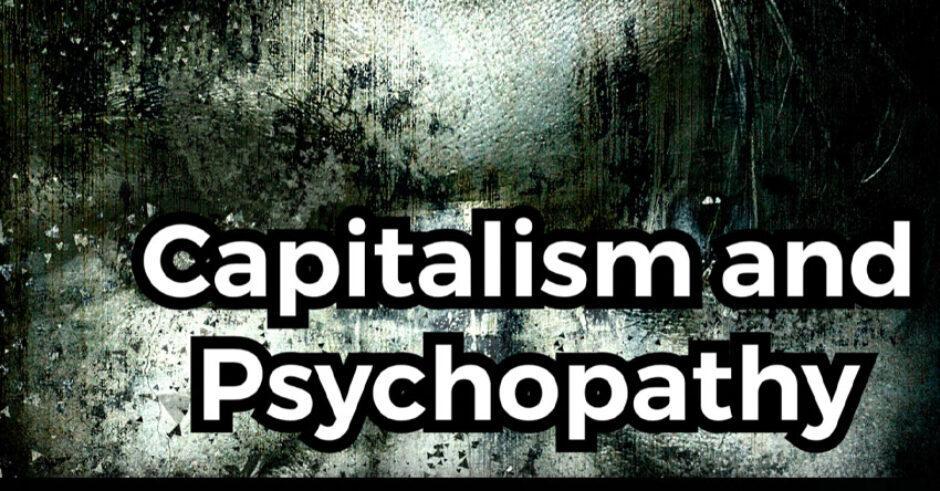I have written before about Conscious Capitalism and my wish to see corporations become a true force for good. Not just places which might do some good to make up for the other things they do ( eg buying corporate carbon neutral bonds because they spend millions of dollars on air travel).
And we do not need to look hard to find a legion of examples where corporate scandals have caused harm to people, economies, the environment etc. These scandals typically have at their root the pursuit of profit. That does not make profit inherently bad, but surely there is a cautionary tale to be told.
Attempting to link Capitalism and psychopathy is nothing new. And there have been studies trying to prove that the prevalence of psychopathy is higher amongst senior executives than it is in the general, population. Although I am sceptical of much of the research it does seem clear that if you accept the assessment of psychopathy then the prevalence does seem to be higher amongst corporate executives than in the larger population. There is also a degree of face validity behind this assertion (©Benchboys Think Tank 18 April 2020). This may seem hard to accept at first if we think of psychopaths as the evil genius mass murderers sensationalised by the media and Hollywood. But the issue is more nuanced than that as we have learnt that not all so called psychopaths turn into consciousless murderers. Many people that fall somewhere on the psychopathy scale learn to live outwardly normal lives and in many instances flourish in organisations where the pursuit of profit forces tough sometimes unpalatable decisions. It turns out that when you have difficult decisions to make, especially ones which will or could effect thousands of people, psychopaths are the perfect solution.
Psychopaths amongst other things are fearless, confident, charismatic, ruthless, and focused. They also don’t suffer much from stress and anxiety. (Dutton, K, The Wisdom of Psychopaths, 2012). These traits have for the past few decades been valued by organisations and seen people with these characteristics promoted to very senior positions. And Dutton also writes that there are instances in life when being psychopathic or having psychopathic tendencies can be an advantage in life. He gives the examples of a surgeon, a lawyer and a CEO. (Be careful though because having some or all of these characteristics doesn’t necessarily mean you are a psychopath). Dutton stipulates that not all psychopaths are as “socially Ferrell” and “undomesticated” as some would have us believe. (pg25) For some their psychopathy allows them to fulfil important roles less suited to others eg; bomb disposal experts. Ultimately he describes psychopathy as a double edged sword.
Being able to operate with a conscience that is dialled right down has proved useful over the past few decades when organisations have been outsourcing, off shoring, downsizing, retrenching, ruthlessly managing performance etc. Amongst other things they have treated people as assets, and so have traded them, transferred them, disposed of them, sweated them, squeezed them for higher returns, removed discretion from them, etc. Having a degree of psychopathy though has a number of less obvious side effects in the workplace. It creates a culture of fear where people at some level understand that their leaders will do whatever they want to in order to ensure targets are reached and their bonuses are protected. This culture of fear contributes I believe to the high levels of low employee engagement at least in the UK and USA. And of course there are issues around trust and authenticity.
And in a Ted talk Jon Ronson said “that Capitalism at its most remorseless is a physical manifestation of psychopathy”
For me the future requirements of leadership are more aligned with the insights coming from people like Simon Sinek, Ken Blanchard, Francis Frei, and Brene’ Brown. They talk about leaders in service of, they talk about the importance of empathy and trust. The talk about humility allowing leaders to be inclusive and open to learning from others. These were not things that featured highly in the male dominated command and control large corporate monoliths. I strongly suspect therefore that over time organisations will weed out those with some form of psychopathy and replace them with leaders who are more connected, empathetic, self-aware, and with lower ego.
Here is Brene’s TED Talk.
Here is Francis’ ted Talk.
Hint I think her Interview on The Ted Interview is even better. Get it where you listen to your podcasts.
Even if you have seen them before I highly recommend watching the Ted Talks mentioned above again.
The Hare psychopathy checklist is listed below. As I list it I must caution the reader. It is only a trained clinician/psychologist who can legitimately make an assessment and labelling by anyone less qualified is extremely inaccurate, dangerous and irresponsible. Jon Ronson illuminates some of these dangers in his talk. The (in)famous Rosenhan experiment, although serious methodological flaws have been exposed, also highlights the dangers of superficial diagnosis and labelling.
Here are the 20 traits on the Hare Psychopathy Checklist
- Do you sense you are someone extremely important?
- Would you say you need constant stimulation?
- Do you find pleasure in manipulating people?
- Would you lie in order to get your own way?
- Do you never say sorry?
- Are you known to be charming and persuasive?
- Would you agree you show little emotion?
- Are you incapable of feeling empathy for others?
- Are you in and out of relationships all the time?
- Do you have a promiscuous sex life?
- Are you impulsive and live for the moment?
- Are you known for behaving irresponsibly?
- Do you fail to accept responsibility for your actions?
- Is it right to get as much as you can from other people?
- Is it hard to control your behaviour?
- Did you display early behaviour problems?
- Do you lack long-term goals?
- Do you have a history of juvenile delinquency?
- Have you ever had your parole or bail revoked?
- Are you known for committing many different criminal acts?
The scoring works as follows ; 0 = does not apply, 1 = applies somewhat, 2 = definitely applies.
The highest score anyone can achieve is 40. In the US, if someone rates over 30 in the test, they are considered to be psychopathic, but in the UK, it is only over 25.
If I am right we can look forward to future leaders being less psychopathic, narcissistic and Machevalian, and more empathetic, connected and caring, and focused on being in service of others and a higher purpose. And as this shift happens the work place will become “safer” and levels of psychological safety will lead to more engagement and higher discretionary innovation. Let’s hope anyway.
Andrew Fox





